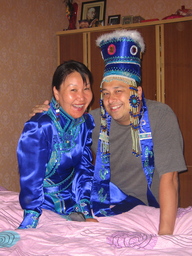
In Traditional
Mongol Garb
 In Traditional Mongol Garb |
There are a couple urban legends I've heard often, both involve the origin of location names here in Xinjiang. I've seen these stories everywhere: printed in guidebooks, passed along by tour guides, even related by teachers (who invariably do not themselves speak the language these place names are derived from). I believed these stories myself until I happened to ask native speakers who gave completely different accounts.
First myth: the name "Urumqi" is Mongolian for "green pasturelands".
I've heard this story from so many sources, be they Uighur, Chinese, or English. Ask anybody from Urumqi what the name of their city means and the response is the same: "green pasturelands". However, only a tiny percentage of people living in Urumqi today actually know Mongolian. After speaking with Meenday, who is a native Mongolian speaker, I'm fairly certain that this story is completely untrue.
Meenday was over at my place a few weeks ago, somehow the topic of riding horses around pasturelands came up. Based on what I'd always heard, I asked her if the word for pasturelands in Mongolian was something similar to "Urumqi". Meenday was utterly lost.
David: "So, 'pasturelands' in Mongolian is 'Urumqi', or something like that, right?"
Meenday: "Huh?"
David: "You know--didn't the name of this city originally come from Mongolian? 'Urumqi' isn't a Uighur word and certainly not Chinese."
Meenday: "Yeah, the word 'Urumqi' is Mongol, but it has nothing to do with grasslands."
David: "Really? Well, what does it mean then?"
Meenday: "Urumqi means nai pi."
David: "No way!"
Nai pi is the Chinese word for the filmy layer that forms on top of yoghurt or cream after it has settled.
Second myth: the Taklamakan Desert means, "the place of no return".
This one is harder to challenge, taklamakan can be broken down in a way that would seem logical:
A huge portion of vocabulary in Uighur and other Turkic languages stems from Arabic. The Arabic word "to enter" is dakhala which could easily be permutated into takla by the time it entered the local language. An "m" sound coupled with various following vowels forms the negative across Turkic languages. In Uighur the word for to come is "kal-", which I can see being close enough to "kan-" It seems reasonable to string them all together and come up with:
enter + no + come
Just for comparison I checked the current version of Wikipedia to see what was posted there. Wikipedia gives a totally different breakdown which doesn't seem very convincing to me. At least it does cite a published work by a Swedish orientalist who was in the region 80 years ago; I'm still not persuaded.
The main reason why I'm suspect about the meaning of the word is because I've asked a couple Uighurs native to Urumqi, neither had heard the story.
 Nisagul |
Nisagul heard a different etymology, which makes more sense to me. Her father knows a lot about local history and customs, long ago he told her that the word came from Perso/Arabic taht-e-makkan. That could mean "the place underground" or "the underground city". That would be plausible, given the ancient cities of the Silk Road and the desertification the region has seen.
Who knows? If there are any linguists familiar with Turko-Altaic languages who stumble across this weblog, please drop me a note. I'll follow up with another post if somebody can offer strong evidence that either of those place-name origin stories really is true.
Trivia: The name Xinjiang is Chinese, meaning "new border" or "new frontier".